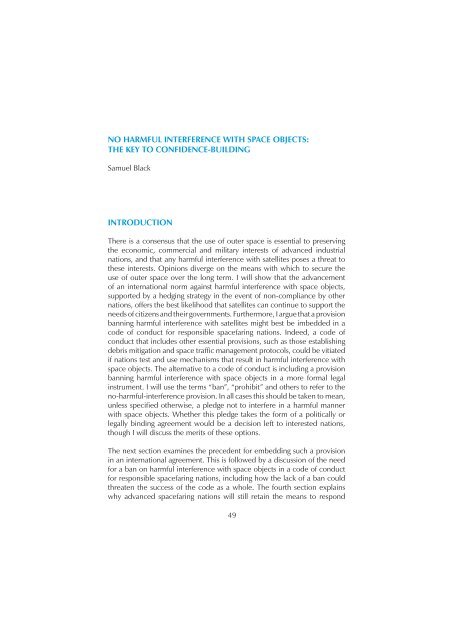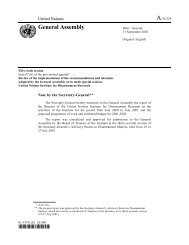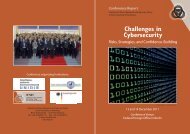Security in Space The Next Generation - UNIDIR
Security in Space The Next Generation - UNIDIR
Security in Space The Next Generation - UNIDIR
You also want an ePaper? Increase the reach of your titles
YUMPU automatically turns print PDFs into web optimized ePapers that Google loves.
NO HARMFUL INTERFERENCE WITH SPACE OBJECTS:<br />
THE KEY TO CONFIDENCE-BUILDING<br />
Samuel Black<br />
INTRODUCTION<br />
<strong>The</strong>re is a consensus that the use of outer space is essential to preserv<strong>in</strong>g<br />
the economic, commercial and military <strong>in</strong>terests of advanced <strong>in</strong>dustrial<br />
nations, and that any harmful <strong>in</strong>terference with satellites poses a threat to<br />
these <strong>in</strong>terests. Op<strong>in</strong>ions diverge on the means with which to secure the<br />
use of outer space over the long term. I will show that the advancement<br />
of an <strong>in</strong>ternational norm aga<strong>in</strong>st harmful <strong>in</strong>terference with space objects,<br />
supported by a hedg<strong>in</strong>g strategy <strong>in</strong> the event of non-compliance by other<br />
nations, offers the best likelihood that satellites can cont<strong>in</strong>ue to support the<br />
needs of citizens and their governments. Furthermore, I argue that a provision<br />
bann<strong>in</strong>g harmful <strong>in</strong>terference with satellites might best be imbedded <strong>in</strong> a<br />
code of conduct for responsible spacefar<strong>in</strong>g nations. Indeed, a code of<br />
conduct that <strong>in</strong>cludes other essential provisions, such as those establish<strong>in</strong>g<br />
debris mitigation and space traffi c management protocols, could be vitiated<br />
if nations test and use mechanisms that result <strong>in</strong> harmful <strong>in</strong>terference with<br />
space objects. <strong>The</strong> alternative to a code of conduct is <strong>in</strong>clud<strong>in</strong>g a provision<br />
bann<strong>in</strong>g harmful <strong>in</strong>terference with space objects <strong>in</strong> a more formal legal<br />
<strong>in</strong>strument. I will use the terms “ban”, “prohibit” and others to refer to the<br />
no-harmful-<strong>in</strong>terference provision. In all cases this should be taken to mean,<br />
unless specifi ed otherwise, a pledge not to <strong>in</strong>terfere <strong>in</strong> a harmful manner<br />
with space objects. Whether this pledge takes the form of a politically or<br />
legally b<strong>in</strong>d<strong>in</strong>g agreement would be a decision left to <strong>in</strong>terested nations,<br />
though I will discuss the merits of these options.<br />
<strong>The</strong> next section exam<strong>in</strong>es the precedent for embedd<strong>in</strong>g such a provision<br />
<strong>in</strong> an <strong>in</strong>ternational agreement. This is followed by a discussion of the need<br />
for a ban on harmful <strong>in</strong>terference with space objects <strong>in</strong> a code of conduct<br />
for responsible spacefar<strong>in</strong>g nations, <strong>in</strong>clud<strong>in</strong>g how the lack of a ban could<br />
threaten the success of the code as a whole. <strong>The</strong> fourth section expla<strong>in</strong>s<br />
why advanced spacefar<strong>in</strong>g nations will still reta<strong>in</strong> the means to respond<br />
49








